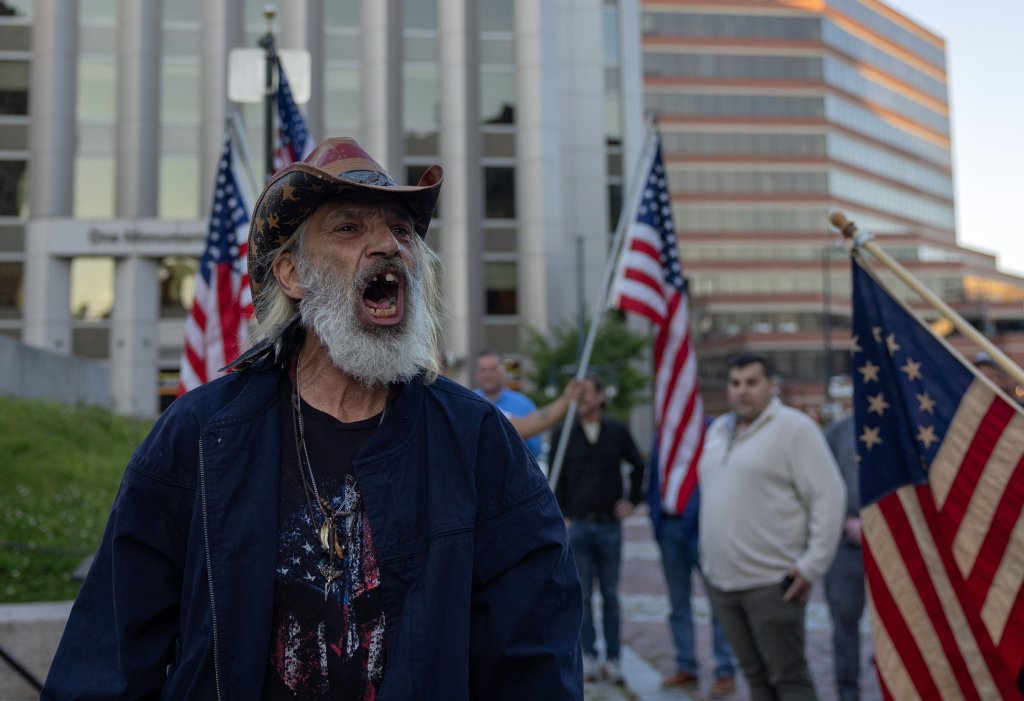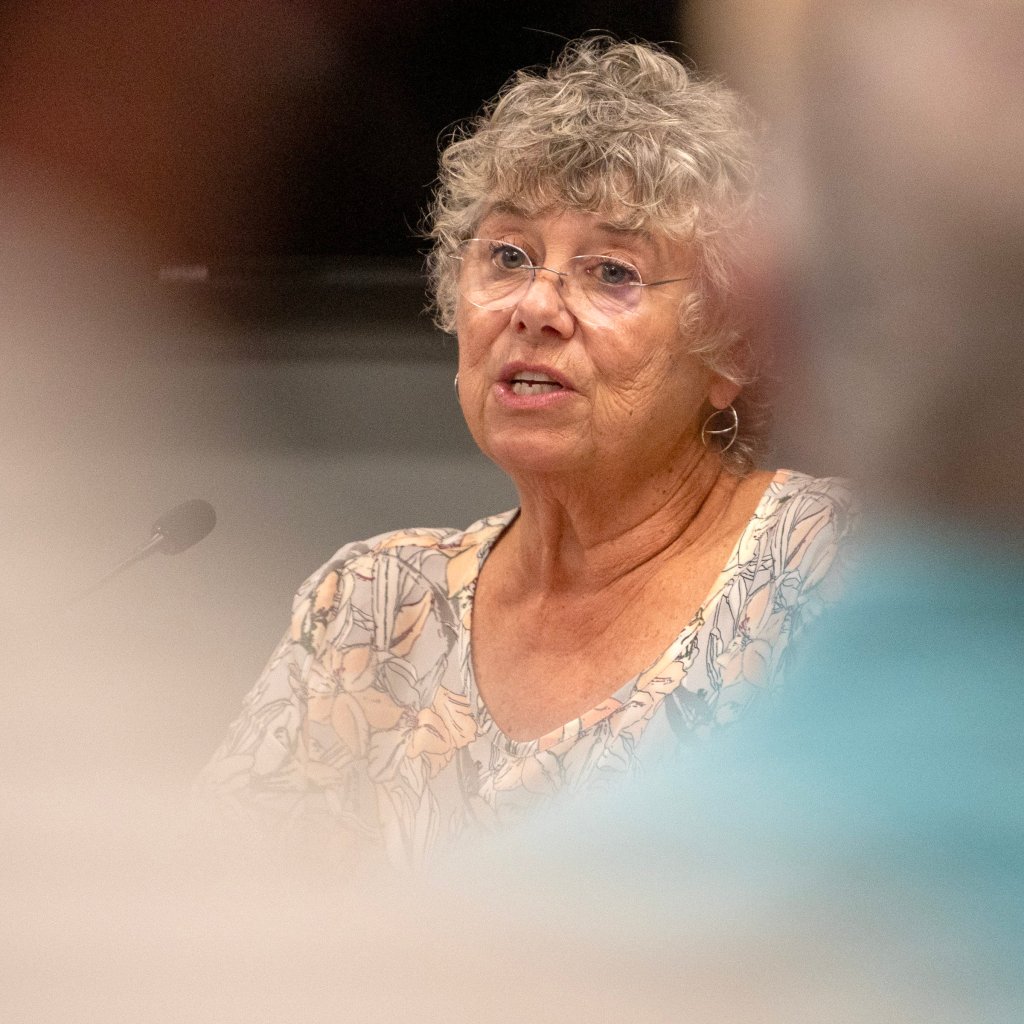As Tim Bodnar stepped up to the podium during the Augusta Board of Education’s Sept. 10 meeting’s public comment period, the St. Albans resident shredded the paper containing Augusta Board of Education’s public participation policy.
“F–k your rules,” said Bodnar, who had come to present a letter at the City Center meeting “Your voice matters? I don’t believe you. You are not trustworthy. You arbitrarily and capriciously enact rules that you’d like to do just at your whim.”

He continued: “Yes, it’s limited, it’s limited to public education. This is a public forum.”
His comments and his letter follow nearly nine months of heated school board meetings in Augusta and elsewhere across central Maine.
Earlier this year at Augusta school board meetings, Pavel Dokukin was arrested but not charged for not adhering to the public participation policy and several others have been escorted out of other meetings.
Attendees have brought up topics like transgender girls playing on girl’s sports teams that have become heated with vulgar language, raised voices and ignoring time limits. To deescalate the situations, chairpersons have often called a recess, which has left some speakers feel they are being silenced and their freedom of speech hindered.
“Your time is up, sir,” Martha Witham, chairperson said to Bodnar, at the Augusta meeting.

“No, it’s not,” Bodnar responded, as he kept talking.
Going back to the letter in his hand, Bodnar argued the chairperson has no right to limit comments during the public comment period of the school board meeting.
Bodnar, who doesn’t have children in the district, is also known as Truth Slinger X, who has a podcast and posts on X, formerly Twitter, and Facebook.
The letter he carried, from Foundation for Individual Rights and Expression, asks the Augusta school board to comply with the First Amendment, which counts freedom of speech among the freedoms it guarantees.
However, because school board meetings are considered limited public forums, the board can set its own policies to follow.
Public forums are areas such as streets, or parks, where people can show up and state their concerns without penalty. A limited public forum is a government sanctioned location that is intentionally opened to hear what specific groups have to say, but certain restrictions on speech may apply.
The public participation policy
Loud and performative comments at school board meetings have been cropping up at school board meetings.
Bodnar caused disorder at the Sept. 17 school board meeting in Lincoln over a teacher’s social media post about Charlie Kirk, the head of Turning Point USA and ally of President Donald Trump, who was shot and killed earlier this month. In June, he was escorted out of a Gardiner-area school board meeting for explosive comments around a school-based health center proposal.
Augusta’s Superintendent Michael Tracy Jr. said he understands the importance of the First Amendment, but a school board meeting is not the place to air concerns over federal executive orders and state law that the district has no control over changing.
Augusta’s public participation policy specifically states a school board meeting is not a public forum. It also allows the board chairperson to set time limits and forbids gossip, defamatory comments or use abusive or vulgar language.
The public participation policies line up with those at Portland, Lewiston, Waterville and Bangor school departments, Tracy said, as do the Title IX policies.
“This is important and should not be overlooked, because many people speaking at our board meeting do not even live in Augusta,” he said, “while most likely their resident town’s school department hosts the very same policies. On average, about half of the people showing up are from out of town.”
School boards began updating public participation policies after the COVID-19 pandemic when community members showed up to meetings in greater numbers, often angry.
“Maine statute requires school boards to provide an opportunity for public comment, limited to school and educational matters, at full meetings of the school board,” said Eric Waddell, the executive director of the Maine School Management Association, an advocacy group for school boards and superintendents. “Boards may impose reasonable time, place, and manner restrictions on activity during the public comment period to ensure that the board’s business meeting is not disrupted and to ensure compliance with confidentiality and privacy laws.”
Waddell, the former superintendent of the Kittery School Department, said that southern Maine district has the same public participation policy as Augusta. He does not know if other school departments have received a letter from FIRE, but he said the MSMA policy is rooted in state statute.
Waddell recommended in a situation such as Augusta’s, where the policy is facing scrutiny, that school board leaders strongly enforce the policy and make sure it is updated.
“I’m certainly not suggesting that Augusta hasn’t enforced their policies. What I am suggesting is that if boards do allow their meetings to be loose rather than tight, it may invite challenging situations, either with the public or even with board members themselves,” he said.
The letter from FIRE
Brennen Vanderveen, program counsel for FIRE, said there are two important limitations on the government’s authority to restrict speech to a limited public form.
First, the government can’t have viewpoint-discriminatory rules and second, any restrictions must be reasonable in light of the forum’s purpose.
Vanderveen pointed to Augusta’s policy that prohibits “abusive language” against a teacher or district employee.
“The current rules are therefore viewpoint-discriminatory because they allow praise and other positive or neutral comments while disallowing certain negative comments,” he said.
The example would stand, he said, if the board banned derogatory comments or comments on protected statuses like race, sex, and sexual orientation.
FIRE considers itself a nonpartisan organization dedicated to protecting free speech.
Vanderveen said FIRE can either be tipped off about a case, or learn about it through news coverage. The practice, once the letter is sent, is to wait for a response. If none is received, the organization will publicize the government agency’s actions on social media, work with local community members, or even initiate litigation, he said.
Vanderveen said Tracy emailed him when the district received the letter and expressed interest in the organization’s recommendations to amend the policy, which Vanderveen said he will send to the school district for review.
The letter says that although a school board meeting is a limited public forum, the board has established time under state law to discuss matters related to education and the Augusta Board of Education.
“Whatever might be said about ‘board meetings’ in full, their public comment sessions carry the quintessential features of a public forum,” the letter says.

We invite you to add your comments. We encourage a thoughtful exchange of ideas and information on this website. By joining the conversation, you are agreeing to our commenting policy and terms of use. More information is found on our FAQs. You can modify your screen name here.
Comments are managed by our staff during regular business hours Monday through Friday as well as limited hours on Saturday and Sunday. Comments held for moderation outside of those hours may take longer to approve.
Join the Conversation
Please sign into your CentralMaine.com account to participate in conversations below. If you do not have an account, you can register or subscribe. Questions? Please see our FAQs.